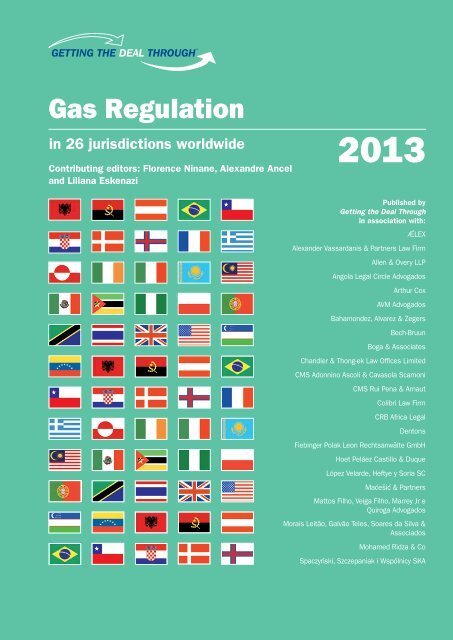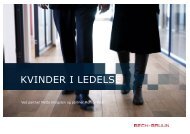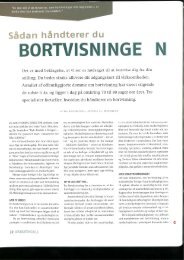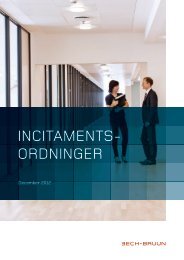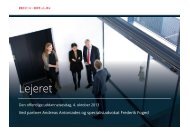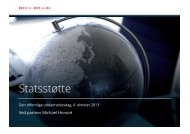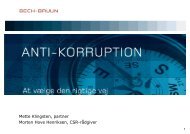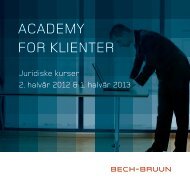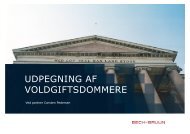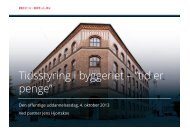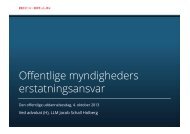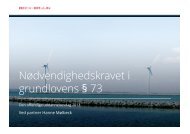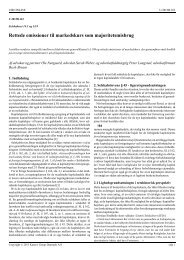Download - Bech-Bruun
Download - Bech-Bruun
Download - Bech-Bruun
- No tags were found...
Create successful ePaper yourself
Turn your PDF publications into a flip-book with our unique Google optimized e-Paper software.
®Gas Regulationin 26 jurisdictions worldwideContributing editors: Florence Ninane, Alexandre Anceland Liliana Eskenazi2013Published byGetting the Deal Throughin association with:Æ´LEXAlexander Vassardanis & Partners Law FirmAllen & Overy LLPAngola Legal Circle AdvogadosArthur CoxAVM AdvogadosBahamondez, Alvarez & Zegers<strong>Bech</strong>-<strong>Bruun</strong>Boga & AssociatesChandler & Thong-ek Law Offices LimitedCMS Adonnino Ascoli & Cavasola ScamoniCMS Rui Pena & ArnautColibri Law FirmCRB Africa LegalDentonsFiebinger Polak Leon Rechtsanwälte GmbHHoet Peláez Castillo & DuqueLópez Velarde, Heftye y Soria SCMaćešić & PartnersMattos Filho, Veiga Filho, Marrey Jr eQuiroga AdvogadosMorais Leitão, Galvão Teles, Soares da Silva &AssociadosMohamed Ridza & CoSpaczyński, Szczepaniak i Wspólnicy SKA
Contents®Gas Regulation 2013Contributing editorFlorence Ninane, Alexandre Anceland Liliana EskenaziAllen & Overy LLPBusiness development managersAlan LeeGeorge IngledewRobyn HorsefieldDan WhiteMarketing managerRachel NurseMarketing assistantsMegan FriedmanZosia DemkowiczCady AtkinsonRobin SynnotAdministrative assistantsParween BainsSophie HickeyMarketing manager (subscriptions)Rachel Nursesubscriptions@gettingthedealthrough.comHead of editorial productionAdam MyersProduction co-ordinatorLydia GergesSenior production editorJonathan CowieChief subeditorJonathan AllenSenior subeditorCaroline RawsonSubeditorsDavet HylandHarry PhillipsEditor-in-chiefCallum CampbellPublisherRichard DaveyGas Regulation 2013Published byLaw Business Research Ltd87 Lancaster RoadLondon, W11 1QQ, UKTel: +44 20 7908 1188Fax: +44 20 7229 6910© Law Business Research Ltd 2013No photocopying: copyright licencesdo not apply.ISSN 1740-7826Albania Renata Leka and Besa Velaj (Tauzi) Boga & Associates 3Angola Helena Prata / Sofia Cerqueira Serra and João Pedro HonoratoAngola Legal Circle Advogados / Morais Leitão, Galvão Teles, Soares da Silva & Associados 8Austria Thomas Starlinger and Tamara Karlovsky Fiebinger Polak Leon Rechtsanwälte GmbH 15Brazil Giovani Loss Mattos Filho, Veiga Filho, Marrey Jr e Quiroga Advogados 21Chile Felipe Bahamondez Bahamondez, Alvarez & Zegers 28Croatia Miroljub Maćešić, Ivana Manovelo and Miran Maćešić Maćešić & Partners 37Denmark Per Hemmer, Johan Weihe and Ranis Kassis <strong>Bech</strong>-<strong>Bruun</strong> 44Faroe Islands Per Hemmer, Johan Weihe and Rania Kassis <strong>Bech</strong>-<strong>Bruun</strong> 50France Florence Ninane, Alexandre Ancel and Liliana Eskenazi Allen & Overy LLP 55Greece Ioannis Vassardanis Alexander Vassardanis & Partners Law Firm 62Greenland Per Hemmer, Johan Weihe and Rania Kassis <strong>Bech</strong>-<strong>Bruun</strong> 69Ireland Alex McLean, Patrick McGovern and Claire Madden Arthur Cox 76Italy Pietro Cavasola and Matteo Ciminelli CMS Adonnino Ascoli & Cavasola Scamoni 83Kazakhstan Zhanar Abdullayeva Colibri Law Firm 89Malaysia Mohamed Ridza Abdullah Mohamed Ridza & Co 95Mexico Rogelio López-Velarde and Amanda Valdez López Velarde, Heftye y Soria SC 104Mozambique Hélder Paulo Frechaut AVM Advogados 112Nigeria Olusina Sipasi and Elu Mbakwe Æ´LEX 116Poland Piotr Spaczyński and Anna Piotrowska Spaczyński, Szczepaniak i Wspólnicy SKA 122Portugal Mónica Carneiro Pacheco and Marisa Apolinário CMS Rui Pena & Arnaut 131Tanzania Charles R B Rwechungura, Cyril J Pesha and Pendo Marsha Shamte CRB Africa Legal 137Thailand Albert T Chandler Chandler & Thong-ek Law Offices Limited 143United Kingdom David Tennant, Sam Szlezinger and Rebecca Owen-Howes Dentons UKMEA LLP 149United States Jason Schumacher, Jennifer Morrissey and Valerie Green, with assistance from Ernest GuadianaDentons US LLP 161Uzbekistan Umid Aripdjanov and Ravshan Adilov Colibri Law Firm 170Venezuela Miguel Rivero and José Alberto Ramírez Hoet Peláez Castillo & Duque 177The information provided in this publicationis general and may not apply in a specificsituation. Legal advice should alwaysbe sought before taking any legal actionbased on the information provided. Thisinformation is not intended to create, nordoes receipt of it constitute, a lawyer–clientrelationship. The publishers and authorsaccept no responsibility for any acts oromissions contained herein. Althoughthe information provided is accurate asof March 2013, be advised that this is adeveloping area.Printed and distributed byEncompass Print SolutionsTel: 0844 2480 112LawBusinessResearchwww.gettingthedealthrough.com
Denmark<strong>Bech</strong>-<strong>Bruun</strong>DenmarkPer Hemmer, Johan Weihe and Ranis Kassis<strong>Bech</strong>-<strong>Bruun</strong>Description of domestic sector1 Describe the domestic natural gas sector, including the naturalgas production, liquefied natural gas (LNG) storage, pipelinetransportation, distribution, commodity sales and trading segmentsand retail sales and usage.Since the mid-1980s, domestic natural gas production and explorationactivity in Denmark and in the other parts of the DanishKingdom (Greenland and the Faroe Islands) has increased dramatically.In December 2010, seven new licences for exploration andexploitation were granted by the Greenlandic government. With theseven new licences the total number is 20. In December 2008, theFaroese government granted three licences under the third Faroeselicensing round. In Greenland and the Faroe Islands explorationactivities have been carried out in 2010, 2011 and 2012 and explorationis expected to continue in the coming years. This chapter,however, concentrates solely on the gas regulation of the Danishmainland and the continental shelf belonging to it. See the chapterson the Faroe Islands and Greenland for details on the other countriesof the Danish Kingdom.In January 2012, the total reserves of natural gas were calculatedat 95 billion cubic metres (bcm) corresponding to 15 years’production of natural gas if activity continues at the 2011 level.Domestic natural gas production is currently located solely offshorein the North Sea and comprises a total of 19 fields, of whichthree fields represent 65.8 per cent of the total domestic production(2011). In 2011, a total of 6.5 bcm was produced from the fields.The main part was supplied to the largely state-owned company,Dansk Olie og Naturgas A/S (DONG; any company belonging to itsgroup is also referred to in this chapter as DONG).Between 2008 and 2010, five licences were granted to explorethe potential of natural gas onshore in Danish territory.In 2011, 97 per cent of all domestic gas production was carriedout by a joint venture, Dansk Underground Consortium (DUC).DUC consists of AP Moeller–Maersk (31.2 per cent ownershipinterest), Shell (36.8 per cent ownership interest) and Chevron (12per cent ownership interest) pursuant to the sole concession grantedto AP Moeller in 1962. Since July 2012, the Danish State has a 20per cent ownership in DUC which is owned through the DanishNorth Sea Fund (Nordsøfonden).There are two gas pipelines from the North Sea to the onshoreprocessing facilities on the Danish peninsula Jutland. These pipelinesare owned and operated by DONG. A natural gas pipeline owned byDONG and DUC from the North Sea to the Netherlands was completedin 2004. Furthermore, the Danish pipeline networks connectto the German and Swedish natural gas pipeline networks. A projectfor construction of a pipeline connection between the Norwegian,Swedish and Danish pipeline networks, called the Skanled gas pipeline,has been put on hold for the time being.DONG and the state-owned company Energinet.dk are theonly providers of natural gas storage facilities in Denmark. Thereare two underground storage facilities, one in Jutland and one inSealand. Energinet.dk is responsible for transmission of natural gasin Denmark.Distribution of natural gas in Denmark is carried out byNaturgas Fyn A/S and HMN Naturgas I/S (which are both ownedby different regional municipalities), the municipality of Aalborgand a company from the DONG group.There is no production of LNG in Denmark. There are 19 naturalgas commodity sales suppliers in the country. Since 2004, allDanish natural gas customers have been unrestricted as regards theirchoice of natural gas supplier.Denmark has been energy self-sufficient since 1997. In 2011,Denmark’s net export of natural gas was 36.8 per cent of the totaldomestic production.2 What percentage of the country’s energy needs are met directlyor indirectly with natural gas and LNG? What percentages of thecountry’s natural gas needs are met through domestic production andimported production?19.8 per cent of Denmark’s total energy needs are met directly orindirectly by natural gas. (figures for 2011). The majority of consumednatural gas was produced in Denmark.There are no LNG facilities in Denmark.3 What is the government’s policy for the domestic natural gas sectorand which bodies set it?The responsibility for the overall strategy and policy for the developmentand regulation of the energy sector is vested in the Ministry ofClimate, Energy and Building. The minister of climate, energy andbuilding is authorised to provide the detailed regulation within thestatutory framework and to grant necessary dispensations.In numerous respects, the minister’s authority to regulate is delegatedto the Danish Energy Agency (DEA), which generally assiststhe minister in respect of administering the law.The governmental policy for the natural gas sector is thus exercisedby the DEA and focuses on environmental, security of supply,competition and public finance issues.Regulation of natural gas production4 What is the ownership and organisational structure for production ofnatural gas (other than LNG)? How does the government derive valuefrom natural gas production?In 1962, the AP Moeller–Maersk Group was granted a sole concessionfor oil and natural gas exploration and production in Denmarkfor a 50-year period, which expired in 2012. Exploration and productionactivities are undertaken by DUC. The area covered by thesole concession was subsequently reduced to the area in the NorthSea where DUC had focused its exploration activities.44 Getting the Deal Through – Gas Regulation 2013
<strong>Bech</strong>-<strong>Bruun</strong>DenmarkIn 2003, the sole concession period of the AP Moeller–MaerskGroup was extended from 2012 through 2042, and the terms wereadjusted so as to include, inter alia, a 20 per cent state participation.The negotiations were carried out within the scope of a specificderogation granted in favour of the Danish state under the ECLicensing Directive (1994/22).Between 1986 and 2008, six licensing rounds concerning theNorth Sea areas outside the area of the reduced sole concession werecarried out. In these rounds, all licences granted were subject to 20per cent ownership interest for the Danish state through DONG(as regards the first five licensing rounds) and subsequently throughthe Danish North Sea Fund (as regards the latest licence round).Production from areas subject to licences granted pursuant to thesaid rounds commenced in 1999. The Danish Government has initiatedpreparations for a seventh licensing round concerning theNorth Sea area, which is planned to be carried out in 2013.In respect of the remainder of the Danish subsoil (primarilyother than the North Sea areas) an ‘open door’ policy has been inforce since 1997. Under the open door policy a number of onshorelicences have been issued in Jutland and Sealand.The government benefits from natural gas production via itshydrocarbon tax and corporation tax receipts and via state participation.The taxation rules applicable to the upstream sector werechanged as of 1 January 2004 and apply to DUC’s new sole concessionand to licences granted after the effective date. Other concessionariesmay, if they so wish, submit to the new taxation regime.In the taxation regime, the hydrocarbon and corporation taxes,both of which are calculated on the basis of income, are 52 per cent(subject to certain mandatory calculation principles as regards theapplicable income) and 25 per cent respectively. State participationis 20 per cent through the Danish North Sea Fund.5 Describe the statutory and regulatory framework and any relevantauthorisations applicable to natural gas exploration and production.The Subsoil Act (1981) provides the framework, whereas adaptationsand more detailed regulation are issued by the minister throughthe DEA. The model licences and guidelines developed by the DEAare of significant practical importance.The minister grants licences that confer an exclusive right onthe holder to explore and to produce or extract natural gas within adefined area and subject to specific terms and conditions. Separatelicences may be granted for exploration and production or extraction,respectively. An exploration licence may grant the licensee apreferential right to a production or extraction licence.The minister may grant licences for a term of up to three yearsfor performing specific types of preliminary investigations in orderto explore and produce or extract natural gas or to exploit the subsoilfor storage or purposes other than the production of natural gas.It is not possible to lease mineral rights from the state. The leasingor farming of mineral rights from a concessionary is allowed butis subject to case-by-case approval by the minister.There are no rules or regulations governing when, where or howmuch natural gas may be produced.In the onshore upstream sector the local authorities have, alongwith the DEA, governmental powers with respect to the supervisionof, for example, the environment and the working environment.Regulation of natural gas pipeline transportation and storage6 Describe in general the ownership of natural gas pipelinetransportation, and storage infrastructure.Energinet.dk is responsible for Danish natural gas transmission andis under an obligation to run the transmission system and ensuresafe delivery to distribution networks at non-discriminatory prices.Natural gas storage facilities are owned by Energinet.dk andDONG. Energinet.dk and DONG are both state-owned companies.The public listing of DONG has been postponed for the time being.Transmission, distribution and storage companies are prohibitedfrom carrying out activities outside the scope of their respectivelicences (see question 7). Effectively, subject to limited exceptions,other activities must be vested in separate legal entities (except forcertain other pipeline and storage-related activities subject to individualpermission by the minister).7 Describe the statutory and regulatory framework and any relevantauthorisations applicable to the construction, ownership, operationand interconnection of natural gas transportation pipelines, andstorage.The statutory legal framework for the domestic downstream naturalgas sector is the Act on Natural Gas Supply (2000), which implementsthe recent EC Gas Directive (2009/73/EC). The act contains arequirement of ownership unbundling of transmission system operatorsfrom undertakings performing production or supply of naturalgas. This requirement is fulfilled, as Energinet.dk is the sole ownerand operator of gas transmission systems in Denmark.Transmission, distribution and storage activities may only becarried out subject to a licence granted by the minister. The licenceruns for a term of at least 20 years. Essential conditions are theapplicant’s ability to demonstrate sufficient relevant skill and financialcapacity.The licence holder must carry out the necessary maintenance,change and expansion of the relevant transportation pipelines orstorage facilities. Significant changes, as well as the construction ofnew pipelines or facilities, remain subject to prior approval by theminister. Licences are not required for natural gas activities carriedout by Energinet.dk and companies within this group. The rulesregarding Energinet.dk’s organisation, activities, etc, are foundin the Act on Natural Gas Supply as well as in a separate act onEnerginet.dk (2004).The Danish Energy Regulation Authority (DERA) and theEnergy Board of Appeal (EBA) generally oversee compliance withrespect to the applicable energy laws, including supervising pricesand licence requirements. Decisions by the minister, the DEA andthe DERA may be appealed to the EBA.8 How does a company obtain the land rights to construct a natural gastransportation or storage facility?In the absence of an agreement with the landowner, and providedthat regard for public interest dictates it, the DEA and the relevantmunicipality can order a compulsory sale of the necessary rightsover land.9 How is access to the natural gas transportation system and storagefacilities arranged? How are tolls and tariffs established?All paying customers must be granted access to the transmissionsystem, the distribution systems as well as to LNG facilities, if any.Where it is technically and economically necessary to enable efficientaccess to the systems, the said companies must grant all customersaccess to storage and line-pack facilities and other help functions.Access must be granted on objective and non-discriminatory conditions.Consequently, transmission, distribution and storage facilityproviders may only deny access to their respective systems in a numberof specifically defined situations, such as a lack of capacity, andsuch denial must be reasoned and can be appealed to the DERA.The transmission system operator must ensure sufficient and efficienttransportation through the transmission network and that thecorrect quality level of the natural gas is delivered from the transmissionnetwork. Ensuring constant balance, capacity, security of supply,and necessary measuring and connecting distribution networkswww.gettingthedealthrough.com 45
Denmark<strong>Bech</strong>-<strong>Bruun</strong>and consumers to the transmissions system are related requirements,with which the said operator must comply.The prices and terms for transmission services are regulated,while the prices and terms for storage facility services, as well aslinepack and other help functions, are negotiated (see question12). In determining prices and terms in respect of transmission andstorage facility services, there must be no discrimination betweencustomers. Prices must take into due consideration the costs of thesystem operators and a reasonable return on investments.Energinet.dk’s transmission prices consist of a capacity elementreflecting the level of occupation of the transmission system thatthe transport in question represents, and a variable price elementdepending on the amount of natural gas transported. Furthermore,the prices consist of a payment for security of supply. Prices arebased on the ‘entry-exit’ principle. The entry-exit prices are currentlyidentical, and the transport element of the payment is thusnot dependent on the geographical location of the destination of thenatural gas in question (the postage stamp principle). The price forstorage facilities also consists of a combination of a capacity elementand a variable volume-related price element. Prices, conditions andthe applicable basis must be notified to the DERA and will be published.The DERA may impose changes, if necessary, because of, forexample, discriminatory or otherwise unreasonable pricing.10 Can customers, other natural gas suppliers or an authority require apipeline or storage facilities owner or operator to expand its facilitiesto accommodate new customers? If so, who bears the costs ofinterconnection or expansion?If transmission, distribution or storage capacity is insufficient to servicedemand, transmission, distribution and storage system operatorsmust expand their facilities, if it is economically feasible, andsubject to prior approval by the minister (see question 7), for exampleby covering the related costs through pricing or by financingoffered in connection with the request for access to the facilities.11 Describe any statutory and regulatory requirements applicable tothe processing of natural gas to extract liquids and to prepare it forpipeline transportation.Activities pertaining to the extraction of liquids and other processingnecessary in the preparation for pipeline transport are subject tothe general requirements of the Natural Gas Supply Act concerning,for example, environmental and quality issues, as well as theEnvironmental Protection Act. More specifically, the requirementsof the Danish Network Code (see question 12) and the rules specifiedtherein must be complied with.12 Describe the contractual regime for transportation and storage.The rules applicable to the use of the transmission network are setout in the latest version of the Danish Network Code. This codeconstitutes the framework of terms agreed among Energinet.dk,the storage operator DONG and the distribution system operators.Energinet.dk will enter into individual contracts with shippers onthe basis of the regulated terms.There are separate codes applicable for the use of the two storagefacilities in Denmark, which consist of the main terms agreedbetween Energinet.dk and DONG. Since the terms for access tostorage facilities are subject to negotiation between DONG andEnerginet.dk respectively and the party requesting access to the storagefacilities, the rules in the codes may be derogated from.Both the Danish Network Code and the two sets of Rules forGas Storage must be notified to the DERA and will be published.Regulation of natural gas distribution13 Describe in general the ownership of natural gas distributionnetworks.Local distribution of natural gas is effected through local networksowned by the state or the local municipalities. Accordingly, the statethrough a subsidiary of DONG owns the distribution network inthe southern part of Jutland and in a part of Sealand. Two othercompanies, Naturgas Fyn A/S and HMN Naturgas I/S (both jointlyowned by the municipalities in their respective regions), as well asthe Municipality of Aalborg, own the distribution networks in themiddle and northern parts of Jutland, in Funen and in the remainingpart of Sealand.14 Describe the statutory and regulatory structure and authorisationsrequired to operate a distribution network. To what extent are gasdistribution utilities subject to public service obligations?A distribution network operator must have a licence and the distributionactivities are governed by the Act on Natural Gas Supply (seequestion 7).The distribution network operator must:• connect consumers;• advise consumers on reduction of energy consumption;• maintain, change and expand the network;• ensure sufficient transport capacity, physical balance, necessarymeasuring and relevant information to consumers; and• contribute to research and development in the area of energy efficiencyand to the improvement of safety in the use of natural gas.The distribution network operator must ensure in its communicationsto consumers that distribution services are distinctly separatedfrom communications and services from affiliated companies performingproduction and supply of natural gas.15 How is access to the natural gas distribution grid organised? Describeany regulation of the prices for distribution services. In whichcircumstances can a rate or term of service be changed?Apart from what is stated in question 9, terms and conditions pertainingto the use of distribution networks are regulated. Accessto the distribution network requires the shipper to have reservedtransportation capacity in the transmission system (in a connectedtransportation agreement).A request for permission to access any particular part of the distributionnetwork should be addressed to the relevant regional operator(see question 13). The individual distribution network operatorhas an obligation to contact other distribution network operatorsif transport via other distribution networks is, in its view, necessaryor sensible.The price for transportation of natural gas in distribution networksis regulated and is defined by reference to the applicable costof energy, salaries, services, administration, maintenance, other processcosts, depreciation and interest on investment. All income ofthe distribution network operator must be allocated to cover thesaid costs.Prices are subject to objective and non-discriminatory criteriaand are mainly based on the amount of natural gas distributed.Individual customer requirements pertaining to, for example, pressure,may trigger separate additional charges. The physical distancewill not affect the price.The DEA can set a maximum for income generated by distributionnetwork operators. Extraordinary earnings may be allocatedto future investments, reduction of prices or extraordinary yield onthe invested capital. The DERA may grant dispensations from themaximum income.46 Getting the Deal Through – Gas Regulation 2013
<strong>Bech</strong>-<strong>Bruun</strong>DenmarkWhen natural gas will pass more than one distribution networkon its way to the consumer, the relevant distribution network operatorswill negotiate the price for such transport. The consumer will,however, only pay the price charged in the network to which he orshe is connected.Prices, conditions and the applicable basis must be notified tothe DERA and will be published. The DERA may impose changes toprices and terms with reference to the applicable principal purposesexpressed in the Natural Gas Supply Act.16 May the regulator require a distributor to expand its system toaccommodate new customers? May the regulator require thedistributor to limit service to existing customers so that newcustomers can be served?Apart from what is stated in question 10 regarding expansion, itshould be noted that anyone situated in geographical areas designatedas natural gas supply areas or anyone being connected to thedistribution network now or in the future has a right to be suppliedwith natural gas. An ensuing right for suppliers and consumers togain access to the relevant networks applies. The facilities must beprovided on objective and non-discriminatory terms. Accordingly,requiring a distributor to limit services to existing customers wouldnot be relevant.17 Describe the contractual regime in relation to natural gas distribution.Apart from what is stated in question 15, contracts between naturalgas distribution companies and natural gas suppliers are subject toeach distribution company’s consumer handling agreement. Thesecontain the terms and conditions, namely allocation of activities,between the natural gas supplier and the distribution company inrelation to the supply of natural gas to the consumers. The naturalgas distribution companies enter into contracts for distribution ofnatural gas with the end-users based on the companies’ terms andconditions for distribution of natural gas.A distribution company’s consumer handling agreement andterms and conditions for distribution of natural gas must be notifiedto the DERA and will be published.Regulation of natural gas sales and trading18 What is the ownership and organisational structure for the supply andtrading of natural gas?There are six natural gas suppliers with and six without specificnatural gas supply obligations. Obligations to supply natural gasapply to suppliers with a licence to supply certain categories ofcustomers. As of January 2013, licences to supply gas with specificsupply obligations are subject to public procurement, namely,a licensing round. A licence is awarded to the supplier that bidthe lowest price for gas supply, and is granted for a period of fiveyears.Since 2004, all customers have had a free choice of natural gassupplier. The supply of natural gas to customers exercising theirright to choose their supplier is not subject to any licence.Trading in natural gas must be organised in a separate legalentity, which does not carry out any other natural gas-related activities(see question 6).19 To what extent are natural gas supply and trading activities subject togovernment oversight?The price for natural gas supplied by companies with supply obligationsunder existing licences is determined by taking into considerationthe relevant costs and prices, terms and the applicable basismust be notified to the DERA (see question 15).The price of natural gas supplied by companies with supply obligations,whose licences are granted by a licensing round, is based onthe offered price with an addition of the transmission price as wellas a fixed addition covering other costs (eg, storage costs). The priceis subject to supervision from the DERA.The prices and terms of natural gas supply from companies withoutspecific supply obligations are negotiated and are not subject tosupervision from the DERA, but from the competition authorities.However, the DERA monitors the level of transparency in wholesalepricing and restrictive practices in the market, and must inform thecompetition authorities of cases of non-compliance with competitionlaw. In order to ensure an effective and competitive market,natural gas suppliers are obligated to keep records of data relatingto all transactions regarding gas supply, which must be available toDERA for at least five years.20 How are physical and financial trades of natural gas typicallycompleted?Natural gas is mainly traded by long-term contracts between theproducers of natural gas and the wholesale customers. Only a smallpercentage of the total gas consumption in Denmark is based onfree trade through Energinet.dk’s Gas Transfer Facility (a virtualgas trading point), where natural gas can be traded bilaterally. Toincrease and facilitate free trade of natural gas, a gas exchange,Nord Pool Gas, was established in 2008.The wholesalers must enter into shipper contracts withEnerginet.dk to access the transmission network based on the termsand conditions in the ‘Danish network Code’ (see question 12).Furthermore, the shipper must enter into contracts for access to thestorage facilities with the relevant storage facility operator (see question12). Retail customers purchase natural gas from the shippersfor resale to end-users and enter into customer handling agreementswith the distribution companies (see question 17). End-users purchasenatural gas from the retailers based on these companies’ termsand condition and enter into contracts with the distribution companiessubject to their terms and conditions.21 Must wholesale and retail buyers of natural gas purchase a bundledproduct from a single provider? If not, describe the range of servicesand products that customers can procure from competing providers.Wholesale customers purchase natural gas transmission servicesfrom Energinet.dk. Distribution services are purchased from theoperator of the natural gas distribution network to which the customeris connected.Natural gas as a commodity is purchased by the end-users fromthe natural gas suppliers as a bundled product, namely, natural gastogether with the necessary transmission and distribution services,but must enter into two separate contracts for supply and distributionrespectively with the relevant company.Regulation of LNG22 What is the ownership and organisational structure for LNG, includingliquefaction and export facilities and receiving and regasificationfacilities?At present, no domestic LNG facilities have been established inDenmark.23 Describe the regulatory framework and any relevant authorisationsrequired to build and operate LNG facilities.The establishment of LNG facilities may only be carried out subjectto permission granted by the minister. Permission may only beobtained if the applicant is able to establish that there is a relevantwww.gettingthedealthrough.com 47
Denmark<strong>Bech</strong>-<strong>Bruun</strong>Update and trendsFrom January 2013, licences to supply natural gas with supplyobligations are granted pursuant to the Natural Gas Supply Act bypublic procurement, namely, licensing rounds. The licensing roundswill be held when the existing licences expire. The purpose of therules of procurement is to secure price competition between thesuppliers of natural gas. There are currently three existing licences tosupply natural gas with supply obligations that cover the obligation tosupply natural gas to costumers in specific geographical areas. Thesethree licences expire in April 2013. A licensing round for the threelicences has been carried out with the application deadline closing on15 February 2013.Between 2008 and 2010, the Ministry of Climate, Energy andBuilding granted five licences to investigate natural gas in Danishterritory through the open-door procedure. In 2010, Total E&PDenmark BV, together with the Danish North Sea Fund, were grantedtwo licences to explore for subterranean oil and gas onshore. At thetime of writing, Total E&P Denmark BV and the Danish North Sea Fundhave asked the local municipality in Northern Jutland and the relevantauthorities for permission to launch further explorations, such as testdrillings and so on. The exploration process is due for completion in2016. If the great potential of natural gas onshore at Danish territoryis confirmed, the production could be a substantial source for energysupply in the future.In February 2013, the government proposed a reduction tothe corporation tax rate from 25 per cent to 22 per cent. However,this reduction is proposed to not apply to income from hydrocarbonproduction in the Danish North Sea. The DUC sole concessionpartners (see questions 1 and 4) have agreed with the governmentunder certain conditions to waive their right for compensation withrespect to the non-application of the corporation tax reduction. Further,the DUC partners have agreed to establish and finance a Danishresearch centre to ensure an improved Danish hydrocarbon recovery.need for an LNG facility. The permission may be conditional oncompliance with terms concerning the particulars of the establishmentand operation of the LNG facility, including safety and environmentalprovisions.24 Describe any regulation of the prices and terms of service in the LNGsector.There are no special rules or regulations concerning LNG prices andterms of services.Mergers and competition25 Which government body may prevent or punish anti-competitive ormanipulative practices in the natural gas sector?The DERA enforces the sector-specific competition regulation of theDanish natural gas sector.The DERA’s main task is to react if companies holding a dominantposition in their respective relevant markets take unfair advantageof their market position. The underlying principle is that theconsumers should enjoy fair, uniform and transparent prices andconditions of supply.Non-sector-specific competition regulation falls under theauthority of the Competition Council.26 What substantive standards does that government body apply todetermine whether conduct is anti-competitive or manipulative?With regard to consumer protection under the Natural Gas SupplyAct, licence-committed undertakings must provide their services onobjective, transparent and non-discriminatory terms.Transmission undertakings must provide rules for utilisationof the transportation system in cooperation with distribution, storageand LNG undertakings (there are currently none of the latter inDenmark). These rules must be objective and non-discriminatoryand accessible to users and potential users of the system.Prices and terms for services from transmission, storage andLNG undertakings must not discriminate between the systemusers.27 What authority does the government body have to preclude or remedyanti-competitive or manipulative practices?If prices and delivery terms are held by the DERA not to comply withthe provisions of the Natural Gas Supply Act, the DERA can orderthe amendment of prices and conditions. Non-compliance with anysuch order may result in daily or weekly fines being imposed onsuch party.If prices, terms or agreements result in an environmentallyor economically inappropriate utilisation of energy, the DERAcan dictate amendments following negotiations with the partiesinvolved.The DERA is authorised to conduct onsite searches in relationto the Natural Gas Supply Act without a court order, and may takecopies of any type of information including accounts, accountingmaterials, books, other business papers and electronically storeddata. If necessary, the police will assist in the exercise of these powers.A licence can be revoked by the minister and the courts if provisions,terms or orders pursuant to the Natural Gas Supply Act arerepeatedly breached.28 Does any government body have authority to approve or disapprovemergers or other changes in control over businesses in the sector oracquisition of production, transportation or distribution assets?Licences granted pursuant to the Natural Gas Supply Act or theSubsoil Act can neither directly nor indirectly be transferred to otherswithout the prior approval of the minister.Any divestiture of direct or indirect ownership interests in a distributionnetwork is subject to a right of first refusal in favour ofthe state. The pre-emptive right expires three months after receiptof the offer. Mergers and acquisitions in the natural gas sector areotherwise subject to EC or Danish merger regulation.29 In the purchase of a regulated gas utility, are there any restrictions onthe inclusion of the purchase cost in the price of services?Since the gas prices are fixed in accordance with the costs specified inthe Natural Gas Supply Act, the purchase costs may not be includedin the gas price.Distribution companies and natural gas traders with existingsupply obligations may include depreciation and interest oninvestments in the calculation of their prices. The DEA may imposemethods for calculation of the said items. Transmission and storagecompanies may ensure themselves a reasonable return on theirinvestments.30 Are there any restrictions on the acquisition of shares in gas utilities?Do any corporate governance regulations or rules regarding thetransfer of assets apply to gas utilities?As stated in question 28, the state has a pre-emptive right in respectof distribution networks.Holders of licences (see question 7) must own the respectivefacilities. A natural gas utility company could not, therefore, transferthe essential assets and continue activities on the basis of a lease. Thetransfer of any licence is subject to prior approval by the minister.48 Getting the Deal Through – Gas Regulation 2013
<strong>Bech</strong>-<strong>Bruun</strong>DenmarkNo director, manager or key personnel holding positions in anynatural gas or transmission company is allowed to participate in theoperation or management of any natural gas producing enterprise.Besides these rules on functional separation, no special corporategovernance standards apply. Transfers of shares or assets otherwiseremain subject to EC or national merger control rules whereapplicable.International31 Are there any special requirements or limitations on foreign companiesacquiring interests in any part of the natural gas sector?No.32 To what extent is regulatory policy affected by treaties or othermultinational agreements?Danish natural gas policy is first and foremost influenced by EUlegislation. In addition, Denmark is involved in international activitiesin a number of different forums, including the European EnergyCharter, the OECD, the International Energy Agency (IEA), the UNand the Nordic Council of Ministers.33 What rules apply to cross-border sales or deliveries of natural gas?No rules specifically concerning cross-border natural gas supplyapply.Transactions between affiliates34 What restrictions exist on transactions between a natural gas utilityand its affiliates?Apart from what is stated in questions 6 and 7, contracts enteredinto by transmission, distribution and storage companies with othercompanies, including companies within the same group, must be atarm’s length.35 Who enforces the affiliate restrictions and what are the sanctions fornon-compliance?For enforcement of ownership transfer restrictions, including competitionrules, see question 25.Per HemmerJohan WeiheRanis Kassisphe@bechbruun.comjhw@bechbruun.comrka@bechbruun.comLangelinie Allé 35 Tel: +45 72 27 00002100 Copenhagen Fax: +45 72 27 0027Denmarkwww.bechbruun.comwww.gettingthedealthrough.com 49
®Annual volumes published on:Air TransportAnti-Corruption RegulationAnti-Money LaunderingArbitrationAsset RecoveryBanking RegulationCartel RegulationClimate RegulationConstructionCopyrightCorporate GovernanceCorporate ImmigrationData ProtectionDispute ResolutionDominancee-CommerceElectricity RegulationEnforcement of ForeignJudgmentsEnvironmentForeign Investment ReviewFranchiseGas RegulationInsurance & ReinsuranceIntellectual Property &AntitrustLabour & EmploymentLicensingLife SciencesMediationMerger ControlMergers & AcquisitionsMiningOil RegulationPatentsPharmaceutical AntitrustPrivate Antitrust LitigationPrivate ClientPrivate EquityProduct LiabilityProduct RecallProject FinancePublic ProcurementReal EstateRestructuring & InsolvencyRight of PublicitySecurities FinanceShipbuildingShippingTax on Inbound InvestmentTelecoms and MediaTrade & CustomsTrademarksVertical AgreementsFor more information or topurchase books, please visit:www.GettingTheDealThrough.comStrategic research partners ofthe ABA International sectionThe Official Research Partner ofthe International Bar Associationgas regulation 2013 issn 1740-7826


